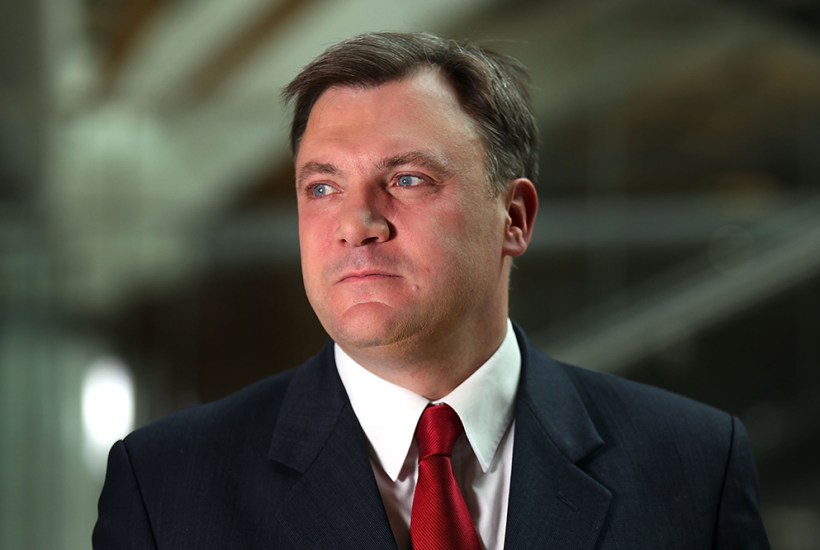The co-host of my new podcast once threatened to sue me for libel. For my part, I did everything I could to put him on the dole. If we’d lived in Tudor times we’d probably have tried to get each other’s heads chopped off. Now Thursdays will be spent with Ed Balls, as we record our weekly show Political Currency. Earlier this summer he was dancing at my wedding. I told him I thought it was an extraordinary turn of events when I recall the ferocity of our old debates. ‘Remember how we hated each other, Ed?’ He corrected me. ‘That’s not true. You and Gordon Brown hated each other. David Cameron and I never liked each other. But you and I always had mutual respect.’ He’s right. There are few people whose insights into economics and politics I’d rate higher, even though we still often disagree. When people want to criticise our show, they say we’re ‘centrist dads’. It’s meant as an insult, apparently. I’m not sure why. Do we want the world run by extremist bachelors?
Tuesday morning, and a group of MPs and peers come to see our latest British Museum exhibition. The director has just resigned so, as chair, I step in to play host. It’s a spectacular, brave show about China in the 19th century that confronts the rebellions and wars which made for one of the most difficult periods in its history. The exhibition has been hugely popular, with tens of thousands of visitors, including many young Chinese. It’s a story no other museum in the world would have the collection or the courage to tell, and a reminder that the BM is more relevant than ever.
One exhibit is a painting, lent by the King, of a Pekinese puppy taken after the British army sacked the Summer Palace, and presented to Queen Victoria. The dog is called Looty. No wonder some of our perennial critics couldn’t resist an ironic smile when they heard we ourselves had been the victims of theft. It’s been a distressing episode, a gross breach of trust from which we have much to learn. If there’s one positive, it’s the way our supporters have rallied round us. Donations have flowed in; so too offers of help. Thanks to voluntary efforts from antiquarian dealers, many stolen items have already been located. After spending more than a century in our stores before they were snatched, perhaps it’s time we put some of these fine items on public display.
Two days later and we’re talking China in the 21st century. I’m speaking at a conference on transatlantic relations with the former US national security advisers Condoleezza Rice and General H.R. McMaster. No one doubts China’s re-rise is a huge challenge to the West – the question is how you build a security structure and global economy that can manage its legitimate aspirations as a country with a fifth of the world’s population, and at the same time contain its illegitimate ones as a communist autocracy. As someone who found the money in austere times to build two aircraft carriers and increase our counter-espionage budgets, while also seeking to tie China further into a global trade system we helped create, I’m convinced we need to try to do both. I’ve got to know Condi now that she runs the Hoover Institute at Stanford University, where I am a visiting lecturer. She combines steely resolve and clear values with the pragmatism of one who has governed at the highest level. Shadow foreign secretary David Lammy was at the conference, and I noticed all eyes on him as the coming man. Power is where power goes. Also there was my good friend Michael Gove, who remains the government’s most creative policy-maker – why it doesn’t make more of his rental reforms is a mystery. When we were young MPs during the Iraq war, we would debate foreign policy issues, and I remember Michael declaring his love for Tony Blair. Now Michael says he is a repentant neocon, no longer convinced that the virtues of free elections and changes of administration are immediately obvious to an oppressed people. I guess it’s the kind of change of thinking that happens when you’ve been in the cabinet for 12 years and there’s a general election round the corner.
Here’s a good political trivia question. Which living British ex-politician met Mao Zedong? The answer, I discovered this week, is William Waldegrave – when he was Ted Heath’s private secretary. Now Provost of Eton, William tells me, half in jest, that the photo always impresses the Chinese leaders aiming to get their children into his famously egalitarian school. For good communists, the struggle takes many forms.
Got something to add? Join the discussion and comment below.
Get 10 issues for just $10
Subscribe to The Spectator Australia today for the next 10 magazine issues, plus full online access, for just $10.
You might disagree with half of it, but you’ll enjoy reading all of it. Try your first month for free, then just $2 a week for the remainder of your first year.








Comments
Don't miss out
Join the conversation with other Spectator Australia readers. Subscribe to leave a comment.
SUBSCRIBEAlready a subscriber? Log in